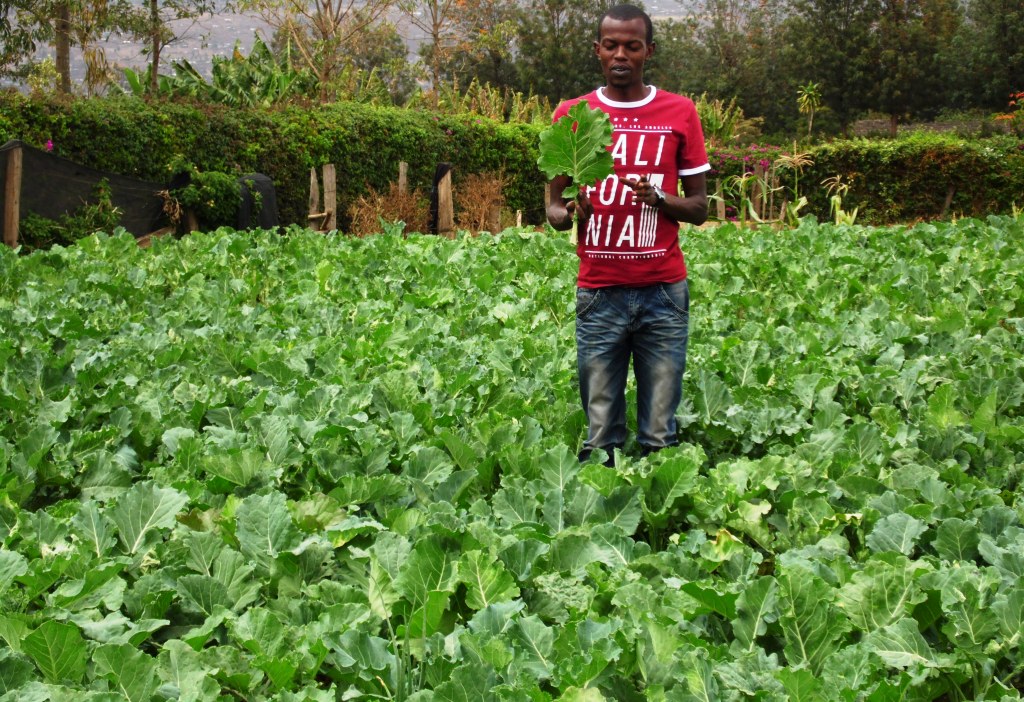Kevin Maingi at his one-eighth kales farm in Nakuru on February 17, 2017. Mulching and organic fertiliser have helped him save on irrigation costs. Photo by Laban Robert.
Application of mulching and organic manure has helped a kales farmer cut the irrigation frequency besides enabling him deliver kales to the market consistently even on dry seasons.
On dry seasons, Kevin Maingi may be required to irrigate the kales in his one-eighth of an acre daily or after one day.
But the discovery of mulching and use of biogas slag have slashed his production costs on fertiliser to zero and irrigation to less than half.
The Nakuru County farmer, who harvests at least one tonne of the sukuma wiki every week from the small piece of land at Lanet, is enjoying a constant market s the vegetable’s supply shrinks during this dry spell.
One kilogramme of sukuma wiki is earning him Sh50.
From the biogas slag of their eight cows, the farmer makes organic manure by mixing the ‘waste’ with farm organic manure in pit. With the high number of microbes in the dung, the green matter is worked upon into rich organic fertiliser.
Together with other green refuse such as grass and plant leaves, Maingi has covered the soil around the vegetables.
“I have reduced the intervals of irrigating the vegetables to twice or sometimes once per week with this rich mulch. The fertiliser is also rich in various nutrients from the diverse crops. I no longer rely on commercial fertilisers, which do not last in the soil after the first season,” he said.
Mulching prevents direct sunlight into the soil. Apart from smothering the germinating weed, it prevents los of water as a result of wind and heat from the sun.
As the mulch rots together with the organisms in the organic fertiliser the farmer added, the soil texture and water holding ability are improved too.
The interspaces among the kales is also reduced from the normal 45cm has been reduced to 30cm. Apart from strangling weed, the canopy of leaves also controls direct sunlight hitting the ground to evaporate the little moisture available after irrigation.
READ ALSO: Plastic mulch drastically reduces production costs
READ ALSO: Organic fertiliser doubles onions, helps farmer penetrate new market
READ ALSO: Vegetable prices double in Nairobi
When the soil structure is intact, erosion is also dismal.
For the past four months of 2016 and 2017 that Rains has not fallen in Nakuru, and indeed most parts of the country, the farmers has never failed to deliver the kales to his market within the town as well as those, who come to the farm.
The farmer rarely uses mechanical weeding. This has not only slashed the weeding costs in the production chain, but also reduced water loss due to exposure of the soil to direct sunlight. He pills the few weeds by hand.
With mulching, reduced soil disturbance in weeding, addition of the manure, the colonies of the soil microbes is growing.
The elimination of fretilisers in the production chain is part of the farmer’s longterm vision of going organic to meet the rising market.
“The emerging market of organic products is offering more than four times the current price so the agro-chemical-dependent goods. That is where money is and I am moving towards that because few farmers are there already,” he said.
And with time, the farmer hopes to reduce production costs by less than half and expand the markets for his organic products.
Early in the year, the cost of kales doubles in major towns in Kenya, with Nairobi buying a 70kgbag at between Sh1,700 and Sh2,200.
Together with other youths, Maina Muchai and Paul Ayieko, Maingi has formed an agribusiness solution company helping farmers in production as well as locating markets.

















Comments powered by CComment